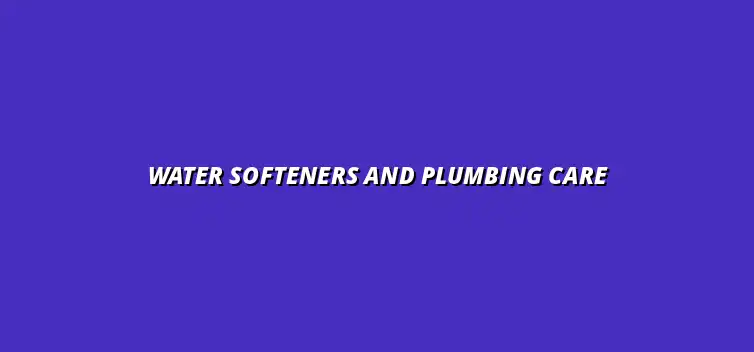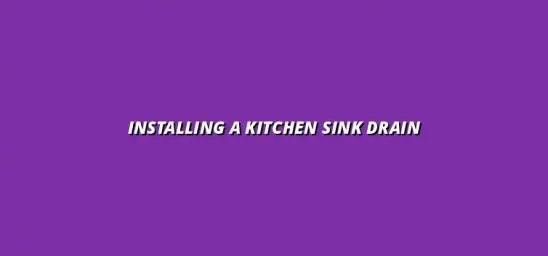
Water Softeners and Plumbing Care
The Importance of Water Softeners in Plumbing Maintenance
Water softeners play a crucial role in maintaining the health of plumbing systems. Many homeowners may not realize how *hard water* can affect plumbing fixtures and pipes over time. Understanding the relationship between water hardness and plumbing maintenance not only saves money but also enhances the quality of life at home!
Understanding Water Hardness and Its Impact on Plumbing Systems
To appreciate the importance of water softeners, we first need to understand what water hardness is. Water hardness is determined by the concentration of minerals, mainly calcium and magnesium, present in the water supply. When these minerals build up, they lead to issues that can harm plumbing systems and appliances. Regular drain cleaning, as highlighted in this helpful guide on regular drain cleaning benefits, is also crucial for overall plumbing health.
What is Water Hardness?
Water hardness is classified into two categories: temporary and permanent. Temporary hardness can be removed by boiling water, while permanent hardness requires additional methods such as water softening. Measuring hardness is usually done in grains per gallon (gpg) or parts per million (ppm).
- Soft Water: 0-1 gpg
- Moderately Hard Water: 1-3.5 gpg
- Hard Water: 3.5-7 gpg
- Very Hard Water: >7 gpg
Effects of Hard Water on Plumbing Infrastructure
Hard water can have several detrimental effects on your plumbing. One major issue is the buildup of limescale inside pipes, which can restrict water flow and lead to clogs. Over time, this can even cause pipes to burst, leading to costly repairs! Preventing plumbing emergencies through proactive maintenance, as discussed in this article on preventing plumbing emergencies, is essential.
- Reduced water pressure
- Increased energy bills due to inefficient appliances
- Shortened lifespan of fixtures and appliances
The Function of Water Softeners in Mitigating Hard Water Issues
Water softeners are designed to address the problems caused by hard water. They work through a process called ion exchange, where minerals like calcium and magnesium are replaced with sodium or potassium ions. This makes the water less dense with problematic minerals and more effective for household use. Understanding hard water heater maintenance is also key; check out these hard water heater maintenance tips.
How Water Softeners Work to Reduce Hardness
When water passes through a water softener, it flows over resin beads that attract the hard minerals. As the beads become saturated, they need to be regenerated, usually by using salt to cleanse them. This process ensures that your water remains soft and your plumbing stays protected!
Types of Water Softeners Available for Residential Use
There are several types of water softeners available, and choosing the right one can make all the difference. Here are a few common types:
- Salt-based softeners: They use sodium ions to soften water.
- Salt-free softeners: They condition the water without using salt.
- Dual-tank softeners: They provide a continuous supply of softened water.
Key Benefits of Incorporating Water Softeners into Plumbing Maintenance
Incorporating a water softener into your plumbing maintenance plan can yield several benefits. These range from increased efficiency of fixtures to savings on repair costs. By softening your water, you can significantly improve your home's plumbing health! For essential bathroom plumbing checks, consider this helpful resource on essential bathroom plumbing checks.
Enhancing Efficiency and Lifespan of Plumbing Fixtures
Water softeners can help maintain the efficiency of appliances like dishwashers and water heaters. When water is softened, it reduces the buildup of limescale, which can significantly extend the lifespan of these important fixtures. This means fewer repairs and replacements for you!
Cost Savings Through Reduced Maintenance Needs
By reducing the wear and tear on plumbing systems, water softeners lead to lower maintenance costs. You can save money in the long run by avoiding expensive plumbing repairs or replacements due to hard water damage. It's an investment that pays off! An annual plumbing maintenance checklist can be extremely beneficial; find one here: annual plumbing maintenance checklist.
Improving Water Quality for Healthier Living Environments
Softened water is not only better for your plumbing; it also improves the overall quality of your household water. Soft water helps soaps and detergents work more effectively, leading to cleaner dishes and laundry. This means a healthier environment for you and your family!
Identifying Signs That Indicate the Need for a Water Softener
Recognizing the symptoms of hard water in your home is crucial for maintaining your plumbing system. If you notice certain signs, it may be time to consider installing a water softener. Here are some common indicators to look out for. Preventing hair clogs in drains is another important aspect of plumbing maintenance; learn more with these tips on preventing hair clogs.
Common Symptoms of Hard Water Problems in Households
Some visible signs of hard water include:
- White scale buildup on faucets and fixtures
- Dry skin and hair after washing
- Soap not lathering properly
Assessing the Readiness for Water Softener Installation
If you notice these symptoms, it’s a good idea to assess your home’s water hardness levels. Testing kits are available that can help you determine if hard water is indeed an issue. If the results show high hardness levels, it’s time to consider a water softener!
Frequently Asked Questions About Water Softeners and Plumbing Maintenance
Many homeowners have questions about water softeners and their impact on plumbing systems. Getting answers to these common inquiries can help clarify the importance of installation and maintenance.
What are the Maintenance Requirements for Water Softeners?
Water softeners require regular maintenance to function effectively. This includes adding salt when needed and periodically cleaning the resin beads to ensure they remain effective. Taking these simple steps can help prolong the life of your system.
How Do Water Softeners Affect Water Usage and Consumption?
Water softeners do not significantly change the amount of water you use, but they can improve its efficiency. By reducing limescale buildup, your appliances will work more effectively, which can lead to lower overall water consumption. This means you can enjoy cleaner water while being mindful of your usage!
Implementing Water Softeners for Effective Plumbing Maintenance
Choosing the right water softener can make a significant difference in maintaining your plumbing system. It's important to consider several factors to find the best match for your home. By following a structured process, you can ensure that the water softener you select meets your needs and effectively addresses any hard water issues. For those in the Birmingham area, consider contacting a local plumber for installation; find one here: Plumber in Billesley, Birmingham.
Taking a close look at your home’s water hardness levels is the first step. This information will guide you in determining the capacity and type of water softener necessary for optimal performance. A thorough understanding of the water quality in your area will enable you to make an informed decision when selecting a system.
Steps to Choose the Right Water Softener for Your Needs
Evaluating your home’s water hardness levels can be done through a variety of methods. You can either conduct a DIY test using a home testing kit or request a water quality report from your local water supplier. Knowing the hardness level will help you choose a softener that effectively reduces mineral content in your water.
- Purchase a water hardness test kit or contact your water supplier.
- Determine the grains per gallon (GPG) of hardness.
- Evaluate your household’s water usage to pinpoint the necessary capacity.
Once you know your water hardness, it’s time to compare different water softening systems. There are several types available, each with its own advantages:
- Salt-based water softeners
- Salt-free systems
- Dual-tank systems
- Magnetic and electronic softeners
Installation Considerations for Water Softeners
When it comes to installing a water softener, you can either do it yourself or hire a professional. Each option has its pros and cons, so it's essential to weigh these factors before making a choice. DIY installation can save money, but professional installation often ensures proper setup and performance.
Some common installation considerations include the space required for the system and the availability of drainage for backwashing. Additionally, it’s crucial to ensure that your plumbing can accommodate the new setup without major alterations.
Routine Maintenance and Care for Water Softeners
Routine maintenance is key to ensuring that your water softener performs effectively over time. To keep your softener in top condition, there are essential practices to follow:
- Regularly check salt levels and replenish as needed.
- Clean the brine tank periodically to prevent buildup.
- Inspect the resin beads for wear and tear.
While most maintenance tasks can be handled on your own, there might be times when you need professional help. Knowing when to call in a technician can save you time and prevent small issues from becoming bigger problems.
Long-Term Impacts of Water Softeners on Plumbing Systems
Evaluating the cost-benefit of a water softener over time can provide valuable insights. While the initial investment might seem high, the savings on plumbing repairs and increased lifespan of fixtures usually outweigh the costs. You’ll likely find lower utility bills too, as softened water tends to be more efficient in appliances.
The environmental impact of water softeners is another consideration. When used responsibly, they can reduce water waste, but some systems can use a significant amount of salt. Being aware of this can help you choose a system that is both efficient and eco-friendly.
Final Thoughts on the Role of Water Softeners in Plumbing Maintenance
In summary, incorporating a water softener into your plumbing maintenance routine can offer numerous benefits for homeowners. From enhancing the longevity of plumbing fixtures to improving water quality for daily use, these systems play a crucial role in maintaining a healthy home environment.
Ultimately, I encourage everyone to take a proactive approach to plumbing maintenance. By implementing a water softener, you’re investing in the future health of your plumbing system and the comfort of your home!





Fixing a Backed-Up Kitchen Sink
Prepare Your Plumbing for Weather
Installing a Kitchen Sink Drain
When to Replace Plumbing Fixtures
Fixing a Jammed Garbage Disposal